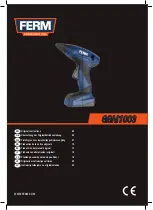
3
GENERAL SAFETY RULES
1. KEEP CHILDREN, VISITORS AND BYSTANDERS AWAY FROM TOOL. Distractions
can cause misuse and possible loss of control. When tool is not operational it
should be locked in a safe place out of the reach of children.
2. USE SAFETY GLASSES AND EAR PROTECTION: Air tool operators and others in
work area should always wear safety glasses and ear protection to prevent injury
from flying debris as well as possible hearing damage.
3. NEVER USE OXYGEN, COMBUSTIBLE OR ANY OTHER BOTTLED GAS as a power
source or it can cause an explosion and serious personal injury. (See fig 2.)
4. DO NOT CONNECT TOOL TO COMPRESSED AIR THAT EXCEEDS 120PSI.
5. MAKE SURE HOSE IS FREE OF ANY OBSTRUCTIONS OR SNAGS. Entangled hoses
can cause loss of balance or footing.
6. KEEP THE TOOL POINTED AWAY FROM YOURSELF and others at all times and
keep hands, any body parts away from rear area to safety guard against possible
injury.
7. DISCONNECT TOOL FROM AIR SUPPLY BEFORE LOADING FASTENERS to
prevent accidental firing during connection.
8. DO NOT KEEP THE TRIGGER OR SAFETY DEPRESSED WHEN LOADING STAPLES.
This can cause unintentional firing and accidental injury may occur.
9. DISCONNECT TOOL FROM AIR SUPPLY HOSE and close the compressor before
performing maintenance and during non-operation.
10. DO NOT OVERREACH DURING USAGE. Maintain proper footing at all times to avoid
loss of balance and possible injury.
11. DO NOT DRIVE FASTENERS CLOSE TO THE EDGE OF THE MATERIAL. This can
cause the workpiece to potentially split resulting in fasteners ricocheting causing
injury to you or your coworkers.
12. DO NOT DRIVE FASTENER ON TOP OF NAILED FASTENERS, or the fasteners can
ricochet causing personal injury.
13. NEVER USE A TOOL THAT IS LEAKING AIR, HAS MISSING OR DAMAGED PARTS
OR REQUIRES REPAIR. and make sure all the screws are securely tightened.
14. ALWAYS OPERATE TOOL IN CLEAN WELL LIT AREAS. Be sure the work area is
clear of any debris.
15. ONLY USE PARTS AND ACCESSORIES recommend by manufacturer.
16. BE AWARE OF MATERIAL THICKNESS DURING USE. A protruding nail can cause
injury.
17. DO NOT DRIVE NAILS BLINDLY INTO SURFACES. Be aware of possible electrical
wires, plumbing or other types of obstructions that can cause injury or damage.
Fig 2.




































